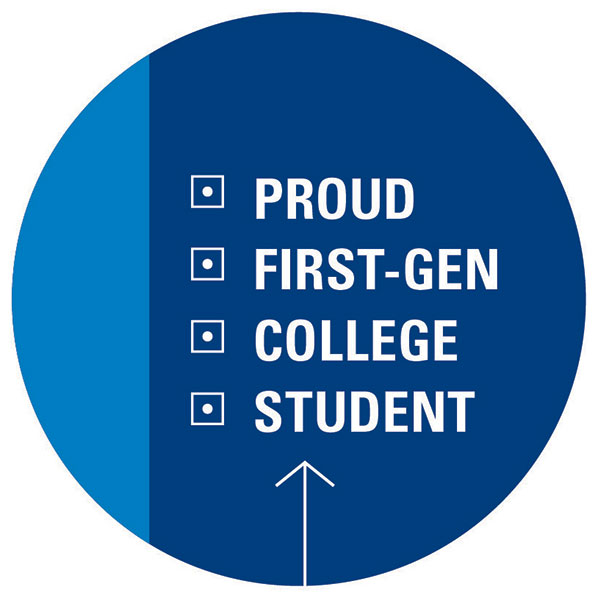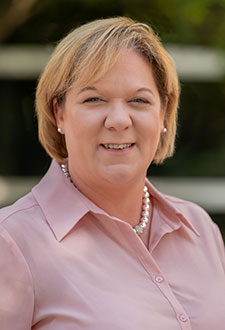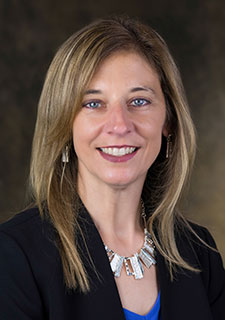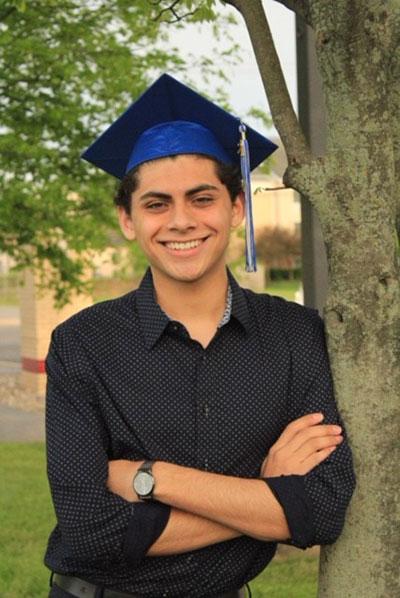A tribute to first-generation students – and the shoulders on which they lean
Published 11.03.2021
News
Events
Student News
Faculty & Staff
 Pennsylvania College of Technology joins in the observance of National First-Generation College Student Day on Monday, Nov. 8, recognizing the proud campus pioneers – generally defined as individuals whose parents do not have bachelor’s degrees – and the college employees and resources helpfully smoothing the trails that they blaze.
Pennsylvania College of Technology joins in the observance of National First-Generation College Student Day on Monday, Nov. 8, recognizing the proud campus pioneers – generally defined as individuals whose parents do not have bachelor’s degrees – and the college employees and resources helpfully smoothing the trails that they blaze.Students and employees who self-identify as first-generation college students – and Penn College has hundreds of them! – can stop by the LEAP Center (first floor, Student & Administrative Services Center) from 3-5 p.m. that day to share their stories and receive buttons to wear in honor of their chosen route.
 Those pathfinders need look no further than the center to find inspiration: Director Christie Bing Kracker is a proud first-generation collegian, earning bachelor’s and master’s degrees at the University of Memphis.
Those pathfinders need look no further than the center to find inspiration: Director Christie Bing Kracker is a proud first-generation collegian, earning bachelor’s and master’s degrees at the University of Memphis.“I was raised with the notion that I was ‘going to college,’ though that had little meaning to me,” she said. “My father, who earned an associate degree when I was a young child, had forgone a further college education to join the Air Force and participate in the Vietnam War. My mother had finished high school and had hopes of more for her children.
“They were supportive and helped prepare me as well as they could, but none of us really understood what ‘going to college’ entailed,” Bing Kracker explained. “I had highs and lows, stumbled and soared to great heights, and relished it all. I lived on campus, I joined student organizations and held leadership positions, I became a Resident Assistant and a student athletic trainer, I excelled in the classroom … but it took three major changes before I found my niche.”
She said she immersed herself in being a college student, but there was a steep learning curve. What most supported her in her journey was an amazing group of diverse friends, a combination of first-generation and legacy students, but she was also blessed with tremendous faculty, residence hall directors and caring staff members from across campus.
“There were those that provided the shoulder to lean on at times and those who provided the proverbial ‘kick in the butt’ when I needed it,” she said. “I found my calling in those four years of undergraduate work – I wanted to be there for other students to help them navigate this amazing, challenging, rewarding process of ‘going to college.’”
In just a few short months, the LEAP Center has proved to be that lifeline.
“First-gen college students often struggle with understanding college processes, the use of acronyms and community-specific language on campus, the pressure to live up to real or perceived expectations, or just feeling overwhelmed by college,” the director acknowledged. “Parents and families want to be supportive, but often don’t know how. The lack of knowledge and understanding can then cause friction in the support structures, even when they are attempting to help their student. Having a support network on campus can be meaningful for first-generation college students as they navigate not only college processes and academics, but also develop their identities and broaden their values and beliefs.”
 Another first-generation student who pays it forward daily – a beacon of accomplishment who understands the staggering challenges all along that road to success – is Sue A. Kelley, dean of Penn College’s School of Business, Arts & Sciences.
Another first-generation student who pays it forward daily – a beacon of accomplishment who understands the staggering challenges all along that road to success – is Sue A. Kelley, dean of Penn College’s School of Business, Arts & Sciences.“I remember life as a first-generation college student vividly. I felt overwhelmed, confused and had no idea to whom to turn for information,” she said. “Although my parents were proud of my accomplishments and fully supported my endeavors, they, too, had no idea what I needed or how to help. In fact, I often didn’t even know that I needed, or would have benefited from help. “
Kelley went to a large university as an undergraduate, which made the experience even more daunting.
“Combine the huge number of offices on campus with my lack of insight into which questions I should have been asking, and it should come as no surprise that I regularly realized ‘too late’ that there were resources available to support me,” she said. “Although I appreciate my undergraduate experience and feel that it was incredibly valuable and fulfilling, I also recognize that there were many missed opportunities and several ways in which my path could have been different ‘had I only known.’”
Reflecting on her own experience is likely one of the reasons that Kelley is so excited about The LEAP Center at Penn College.
“LEAP advisers are exceptional mentors who can answer questions, provide guidance, and offer referrals to offices and resources to support students’ educational journeys,” she said. “The goal of The LEAP Center and LEAP advisers (in conjunction with academic advisers) is to help students navigate the academic world beyond high school, find their way and be successful.
“There may be times at which you feel overwhelmed and confused. Know that there are people on this campus who are ready and willing to help. Do not be afraid to ask questions. Listen to the advice that is offered. Seek out opportunities; don’t wait for them to find you. Use the knowledge and support of LEAP advisers, academic advisers, faculty and administrative staff to help forge your path and construct better tomorrows.”
First-generation students, forging into their futures on their chosen campus, will be profiled throughout the week on Penn College’s social media platforms, including:
Rodrigo Barrios-Piedra
Avondale
Building science and sustainable design: architectural technology concentration
 "My motivation for pursuing a degree in the field of architecture and sustainable design is my family,” he said. “Being the first child to attend high school and college in my family is an achievement to me and my parents. My parents have sacrificed everything so that I could reach my dreams. My passion for architecture goes past designing; it’s the aspect of self-expression and creating homes that will sustain human life."
"My motivation for pursuing a degree in the field of architecture and sustainable design is my family,” he said. “Being the first child to attend high school and college in my family is an achievement to me and my parents. My parents have sacrificed everything so that I could reach my dreams. My passion for architecture goes past designing; it’s the aspect of self-expression and creating homes that will sustain human life."Among the campus resources that have benefited Barrios-Piedra are Career Services and The Dr. Welch Workshop: A Makerspace at Penn College.
“These resources have helped me attain more knowledge of my schoolwork and jobs,” he said. “They have prepared me for the real world that I will be stepping into after graduation."
Nathanael M. Fivie-Eden
Columbia Cross Roads
Human services and restorative justice
 Fivie-Eden chose Penn College because it is far enough from home to offer independence, but still convenient when homesick moments occur. His choice of major? A reflection of growing up in a family that always helped out in the community.
Fivie-Eden chose Penn College because it is far enough from home to offer independence, but still convenient when homesick moments occur. His choice of major? A reflection of growing up in a family that always helped out in the community."My uncle worked with troubled youth ever since I can remember, and that pushed me toward working with youth and teens,” he said. “Since I am the first person from my family that went to college, I want to show them all I can do it and make them proud."
A number of campus services have been invaluable in his transition to college life, he said – most notably The Tutoring Center, Madigan Library and the Financial Aid Office.
Emma M. Mercer
Mill Hall
Graphic design
 Mercer’s early embrace of art developed into an interest in graphic design around middle school.
Mercer’s early embrace of art developed into an interest in graphic design around middle school.“It wasn’t until high school that I decided to do it for a living,” she said. “The design students at PCT put out amazing work, and they inspire me to better my own art.”
Able to take a college design course while a student at Williamsport Area High School, Mercer heard only good things about Penn College from her graphic design teacher. “I had also been on campus a few times for field trips and design competitions, so I already knew that I liked the environment before I even applied!”
"I’ve been in the makerspace a few times, and the resources they provide can be super useful for design projects that require physical deliverables," she said. “I also use the print center whenever I need something printed that can’t be done on the regular printers in our classrooms!"